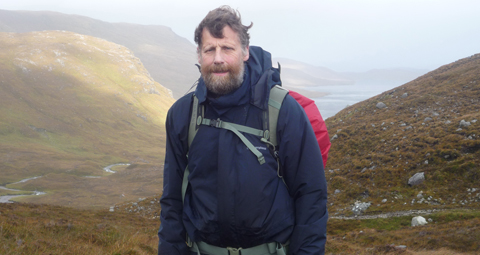June 2 | ![]() 0 COMMENTS
0 COMMENTS ![]() print
print

The Christian spirituality of Harris & Lewis
IAN DUNN speaks to author Alastair McIntosh about his new book Poacher’s Pilgrimage, a journey through the Outer Hebridean Islands, and discovers how the Quaker’s peripatetic life has been influenced by Christian values
Alastair McIntosh’s most recent book, Poacher’s Pilgrimage, is the story of a remarkable journey, a brutal trek the length of Harris and Lewis that revealed the ancient Christian heritage of the Hebridean islands.
It was a physical journey that echoed the spiritual one he has been on his whole life, that’s taken him from strict Presbyterian upbringing on Lewis to embracing peaceful Quakerism with many stops along the way—including living with a Catholic archbishop in Papua New Guinea.
The book is a warm and engaging tale of how the author, activist, and scholar returned to the island of his youth for a south-north tour to explore the spirituality of the place, from its relatively modern Calvinist tradition back to its Catholic roots.
Harris and Lewis are stuffed with largely forgotten markers of Christian heritage and Mr McIntosh starts his trek at the southern tip of latter isle, at St Clement’s Church of Rodel, one of two restored pre-Reformation chapels on the island. He then winds through the mountains of Harris.
After crossing the Grimersta, a river that ‘bellows from the island’s heaving heart and surges to the sea,’ he moves through flat moorlands to the island’s northernmost point, the Butt of Lewis—but beyond the physical journey his walking reflection takes him deep into the past, considering the spiritual history that shaped him and all the island’s people.
“Part of what I’m attempting to do with the book is to try to understand our history and how it’s affected our perceptions of spirituality,” he told the SCO. “Obviously we are talking about the outer edge of Europe, but spiritually, in St Columba’s time, in many ways it was the heart of things. It was the era which people carried Faith and learning from Ireland and Scotland back into central Europe. So you have this dynamic where the centre collapses and the periphery becomes central.”
He suggested that as ‘we seem to have a centre that could be collapsing again,’ the ‘periphery is becoming central once more.’
He stresses that before the reformation there was a ‘false distinction’ between the west coast of Scotland and Ireland because ‘that whole area would really have a single culture, a Celtic spiritual past that was not Irish or Scottish, but was actually a synthesis of both of them.’
Yet growing up Presbyterian on Lewis he saw Ireland in a very different light.
“Back then my father would say things on Bloody Sunday like ‘we should bring back the B-Specials’—it was that kind of dynamic,” he recalled. “On Lewis we were told by our school teachers about ‘papist superstitions’ down in the southern Hebrides, and to be honest Barra seemed further away than Africa to us—at least with Africa you got Protestant missionaries reporting back and coming round the schools.”
He says that when he first went to the South of Ireland, it ‘astonished me that they didn’t think of themselves as British—that is how poorly educated we were about the Irish.’
He suggests that hostility to the Irish and Catholics was because Ireland was ‘othered,’ partly because ‘England had colonised it, and lowland Scotland had also become part of that colonisation.’
“Therefore whenever you have a colonisation the coloniser has got to inferiorise the colonies in order to justify the colonisation,” he said.
Part of the reason that process was so vigorous in Harris, he thinks, was to forget that those islands had been converted from Catholicism forcibly.
“In the book I explore these places of pilgrimage that had fallen into ruin following the Reformation; of the clean break that was imposed upon the islands, that was imposed because after the 1745 uprising Redcoat troops were dispatched to the isle of Lewis, to root out any Catholic priests who may have been hiding as well as to uncover hidden weapons,” he said. “When you see texts, in the classic history of the islands, there’s no two ways about it: that military force was used to affect that change. We never realised that growing up.”
He says when he first went to Ireland in the early 1970s, his ‘first impression, with all these shrines to the Virgin Mary, is that it was away with the fairies.’
“But as I got to know the Irish,” he said, “I realised that they were basically the same people as ourselves, but history had led us to see ourselves as something different.”
The strange course of his life kept bringing Mr McIntosh face to face with Catholicism and he learned that ‘behind that simple faithfulness was a very deep Faith.’
He was to see that first hand when in 1977 he applied for voluntary service and was posted to a Catholic mission in Pupua New Guinea run by Patrick Virgil Patrick Copas, a retired bishop from Australia, and four Mother Teresa missionary nuns.
”I just loved them—we got on like a house on fire,” he said. “And the bishop was a wonderful man. He had this huge big bishop’s house but he lived in a tiny corner of it, and the whole rest of it was given over to local people who had nowhere else to stay.
“And there I came to appreciate that while in the Protestant religion we had an emphasis on religiosity, these folk had less emphasis on religiosity but a very strong sense of spirituality.
“As you probably know, amongst Protestants there can be an unease around spirituality. They might dismiss it as being a bit new age or not comfortable mystically. What I loved about the Catholics was that they were comfortable with the mystical.”
On his return to Scotland he ended up serving on the management committee of SCIAF, Duncan McClaren pressing him into service to use his MBA to help order their accounts—but fate would take the life-long Pacifist to a still odder place: British army officer training college at Sandhurst, where he lectures on non-violence.
“The bottom line that I say to them is that Jesus never taught violence, Jesus fought and lived without violence,” he said. “Therefore to justify war in the Augustinian sense, I think is a misunderstanding of the Gospels. I say that if they are who they say they are they need to be honest about being peacemakers. They need to be open to understanding non-violence, and not just understanding how to wage war.
“It gets a very good reception. This year I’m going back down to the UK defence academy in July and that’ll be the 20th time this year running.”
It’s a long way for the pilgrim of his new book, tramping his way through the Hebridean bog—but he’s insistent that the book is the best work he’s ever done.
“Other thing’s might be more important, I don’t know,” he reflects. “But it took me seven years to write it. I’d like to think there’s a lot of layers in there.”
And he hopes that a Scottish Catholic audience might read it and ‘get out of it a deeper understanding of the politics that have led to the sectarianism.’
“They might see what is happening in the world today and realise we have to treat that as a spiritual wake-up call,” he said. “I would hope also that a Catholic reader would, especially in light of what the Pope said on New Year’s Day about non-violence, reflect upon that and start to consider the power of non-violence to be a driver of a deepening Faith and transformation in the world.”










